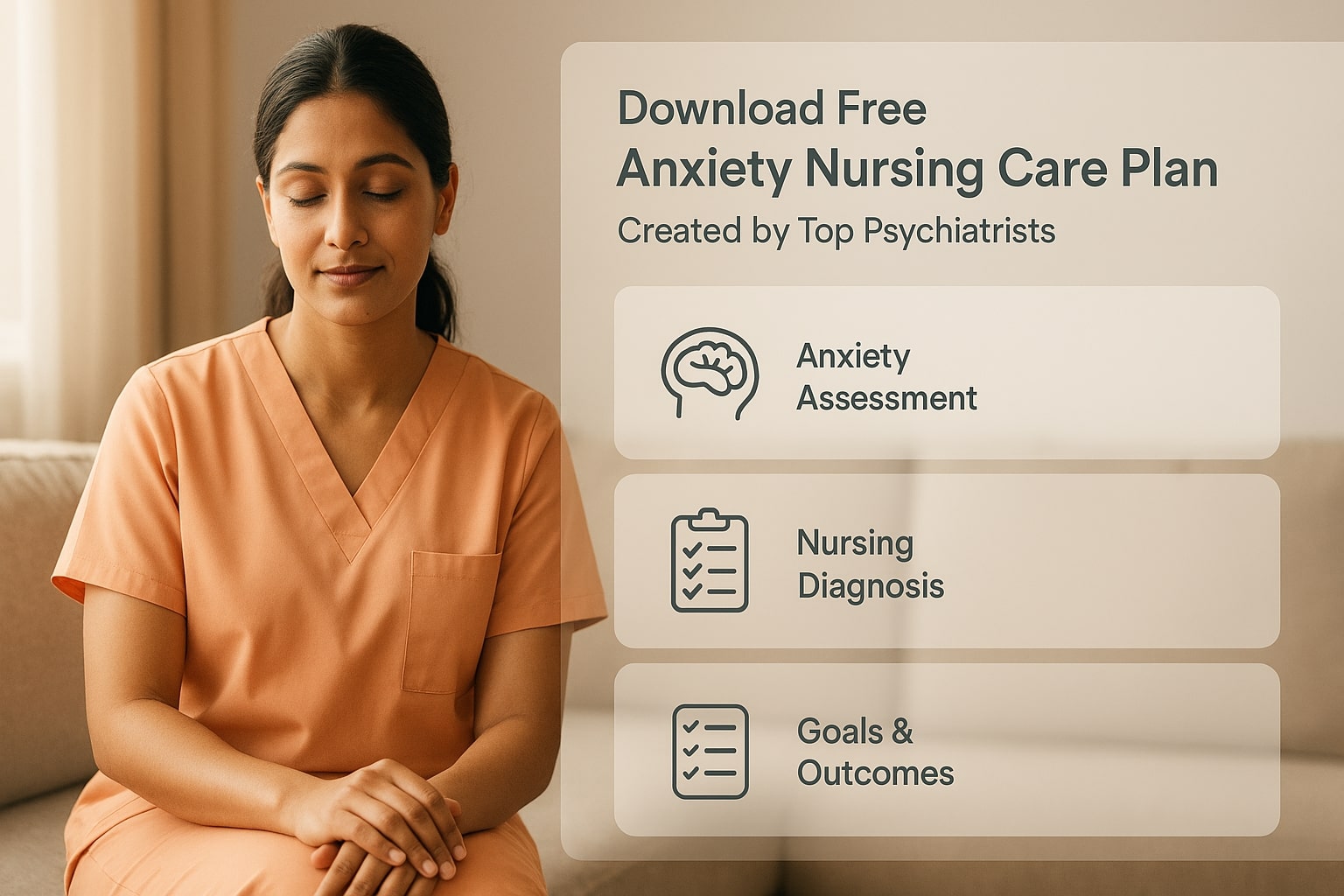
Amaha / / / Understanding Anxiety Nursing Care Plans: A Guide to Better Mental Health Management
ARTICLE | 6 MINS READ
Understanding Anxiety Nursing Care Plans: A Guide to Better Mental Health Management
Published on
4th Sep 2025

Dr Aruna Sri Sikha
MD Psychiatry

Nearly 40% of Indians will experience an anxiety disorder at some point in their lives, yet less than 10% receive proper structured care. That's where anxiety nursing care plans come into the picture, serving as a bridge between overwhelming symptoms and meaningful recovery.
"An anxiety care plan is a roadmap that transforms chaos into clarity, giving both patients and healthcare providers a shared language and structured program for anxiety recovery," says Dr Aakriti Peshion, a psychiatrist at Amaha, Delhi.
What Exactly Is an Anxiety Nursing Care Plan?
An anxiety nursing care plan is a step-by-step guide that helps manage anxiety in a structured way. Unlike generic treatment approaches, these plans are tailored to individual circumstances, considering everything from cultural background to family dynamics.
The nursing care plan for anxiety disorder typically includes detailed assessments from symptoms to triggers and root causes, specific interventions, medication schedules and measurable goals. They provide a holistic approach to anxiety recovery. They don't just focus on symptoms; they consider the person behind the diagnosis. A good anxiety care plan recognises that anxiety manifests differently in a college student preparing for competitive exams versus a new mother dealing with anxiety due to postpartum concerns.
The Science Behind Anxiety Nursing Care Plans
Studies show that patients with documented nursing care plans experience 35% better outcomes compared to those receiving standard care without structured planning.
Structured care planning lowers panic frequency, reduces hospital visits, and improves adherence to treatment. Why? Because anxiety tends to spiral. The human brain, when flooded with cortisol and adrenaline, struggles to think logically. A care plan for anxiety acts like an external brain, keeping things organised when emotions run wild. When our amygdala goes into overdrive; structured interventions can help regulate the fight-or-flight response. These plans incorporate evidence-based techniques to help clients navigate anxiety better.
The beauty lies in their systematic approach, nursing care plans for anxiety create measurable checkpoints. This allows healthcare providers to adjust interventions based on real progress, not just intuition.

Click Here to Download Free Anxiety Nursing Care Plan Created by Top Psychiatrists
Why Healthcare Providers Rely on These Plans
Nurses often spend more direct time with patients than doctors do. This positions them uniquely to observe anxiety patterns, triggers, and responses to interventions. An anxiety nursing care plan capitalises on this relationship.
They ensure continuity of care, especially important in hospital settings where shift changes are frequent. They also provide legal documentation of care provided and create accountability for both patients and healthcare teams.
For nurses themselves, these plans reduce guesswork. Instead of wondering "What should I do when Mrs. Gupta starts hyperventilating before her medications?" The plan provides clear, predetermined steps. This consistency improves patient confidence too, they know what to expect and feel more secure in their care.
How Anxiety Care Plans Are Generated
The process typically unfolds in several stages:
1. Assessment Phase: Clinicians conduct detailed interviews, observe behaviours, and collaborate with other healthcare providers. They're looking at everything from sleep patterns to social support systems and family history.
2. Diagnosis Phase: Identifying whether it’s generalised anxiety, panic disorder, or social anxiety. The diagnosis phase generally tries to understand the root causes behind anxiety.
3. Goal setting Phase: These need to be SMART—Specific, Measurable, Achievable, Relevant, and Time-bound. Rather than saying "Patient will feel better," a proper goal might be "Patient will demonstrate two relaxation techniques within 48 hours."
4. Interventions: strategies like progressive muscle relaxation, journaling, therapy sessions, or medication schedules.
5. Implementation and Evaluation: The plan gets put into action, with regular monitoring and adjustments based on patient responses.

Want to check the severity of your Anxiety Symptoms?
Take the Amaha anxiety assessment to check your symptoms and their impact on you
When Do People Need Anxiety Care Plans?
Timing matters enormously with anxiety nursing care plans. They're particularly crucial during hospitalisation, when familiar coping mechanisms aren't available. Imagine being in a hospital bed, surrounded by unfamiliar sounds and smells, worried about test results. That's when structured anxiety management becomes essential.
These plans are also vital during major life transitions. New mothers dealing with postpartum anxiety, elderly patients adjusting to chronic illness, or teenagers facing academic pressure all benefit from structured approaches.
Emergency situations call for immediate anxiety care planning too. When someone arrives at the emergency department with panic attack symptoms, having a standardised approach helps healthcare providers respond effectively whilst ruling out physical causes.
Who Actually Uses These Plans?
The primary users are registered nurses, clinicians or even caregivers, but the collaborative nature means many professionals contribute. Psychiatric clinicians specialise in mental health applications, whilst medical-surgical nurses might focus on anxiety related to physical conditions.
Amaha’s trained and licensed therapists have developed standardised protocols which include tools like nursing care plans to help the client and family members achieve better recovery and outcomes.
Family members or caregivers at home are also immensely benefited by these structured care-giving plans. When properly educated, families can support plan implementation at home, recognising early warning signs and implementing agreed-upon interventions.
How Patients, Families or Caregivers Can Use Anxiety Care Plans
Patients don’t have to be passive with an anxiety nursing care plan. Start by asking questions, tracking triggers, noting symptoms, or rating anxiety as low, moderate, or severe. Understand planned interventions, expected outcomes, and how progress will be measured—nurses value active participation.
Practice techniques like progressive muscle relaxation, breathing, or grounding exercises during calm moments so they’re effective when anxiety strikes. Track your responses to interventions; journaling about anxiety levels, triggers, and what was effective and what worked better for you helps refine the plan.
Remember, a care plan isn’t fixed, it should evolve with your patterns and changing life circumstances.
Making Anxiety Care Plans Work in Indian Society
In India, anxiety nursing care plans must account for cultural factors: joint families, religious beliefs, and mental health stigma shape how anxiety appears and is managed.
A young woman from a conservative family may show anxiety differently from someone liberal, so the nursing care plan must respect such differences while ensuring effective interventions.
Language barriers also raise anxiety; effective care plans for anxiety disorder consider local languages and communication styles. Similarly, prayer, meditation, or spiritual practices should be integrated into the plan rather than ignored.
The Future of Anxiety Management
Technology is reshaping anxiety management through mood-tracking apps, trigger and cause tracking, and telemedicine, offering real-time data and frequent check-ins without hospital visits.
Yet the human connection remains central; the bond between clinician and patient anchors every intervention. Amaha provides structured advanced care protocols tailored towards outcomes and recovery from self-care app, assessments, diagnosis to therapy and psychiatric sessions.
An anxiety nursing care plan isn’t a cure but a compass providing direction when anxiety feels overwhelming. Whether in a Mumbai hospital or a Bangalore student’s diary, it brings order to chaos.
Everyone deserves structured, compassionate anxiety care, and these plans are a vital step in India’s healthcare journey.
Frequently Asked Questions:
What is included in an anxiety nursing care plan?
An anxiety nursing care plan includes comprehensive patient assessment, specific nursing diagnoses related to anxiety, symptoms experienced by the client, triggers and root causes, measurable goals, evidence-based interventions like relaxation techniques and coping strategies, and regular evaluation methods. It covers psychological, physical, and social aspects of anxiety management tailored to individual patient needs.
How long does it take to create a nursing care plan for anxiety?
Creating a comprehensive nursing care plan for anxiety typically takes 2-4 hours initially, including patient assessment, consultation with healthcare team members, and documentation. However, the plan requires ongoing updates based on patient progress, usually reviewed every 24-48 hours during hospitalisation or weekly in outpatient settings.
Can family members help implement an anxiety care plan?
Yes, family members play a crucial role in implementing anxiety nursing care plans, especially in Indian healthcare contexts. Nurses often educate families about recognising anxiety triggers, supporting relaxation techniques, and maintaining consistent routines. However, specific medical interventions should only be performed by qualified healthcare professionals.
What's the difference between an anxiety care plan and regular treatment?
An anxiety nursing care plan provides a structured, individualised approach compared to general treatment. It includes specific, measurable goals, documented interventions, regular progress monitoring, and involves multiple healthcare professionals. Regular treatment might be more generic, whilst care plans are tailored to individual patient circumstances, cultural background, and specific anxiety manifestations.
How effective are anxiety nursing care plans in treating anxiety disorders?
Research shows anxiety nursing care plans improve patient outcomes by approximately 35% compared to standard care without structured planning. They provide consistent approaches to anxiety management, reduce hospital readmission rates, and improve patient satisfaction scores. Effectiveness increases when plans are culturally appropriate and include patient and family education components.
Who uses an anxiety nursing care plan?
It’s used by nurses, psychiatrists, counsellors, and sometimes patients themselves to track and reduce anxiety symptoms.
Can patients create their own anxiety care plan?
Yes. Patients can keep a personal plan with daily checklists, triggers, and coping strategies to monitor progress.
Was This Article Helpful?
Yes
No



Build a good life for yourself
with Amaha
Best App
for Good
on Google Play India

Amaha is equipped to provide care and support for individuals experiencing severe psychological distress, including complex psychiatric disorders and other complex conditions. For those in need of more intensive care and daily support, we are launching an in-patient care facility in Bengaluru soon.
If you or someone you know is experiencing at-risk behaviors or safety concerns, or any other life-threatening crisis or critical mental health situation, contact a helpline or go to the nearest hospital or emergency room. Having a close family member or friend with you for support can be invaluable during this time.
For emergency mental health support, please call the national Tele MANAS helpline at 1-800 891 4416.
